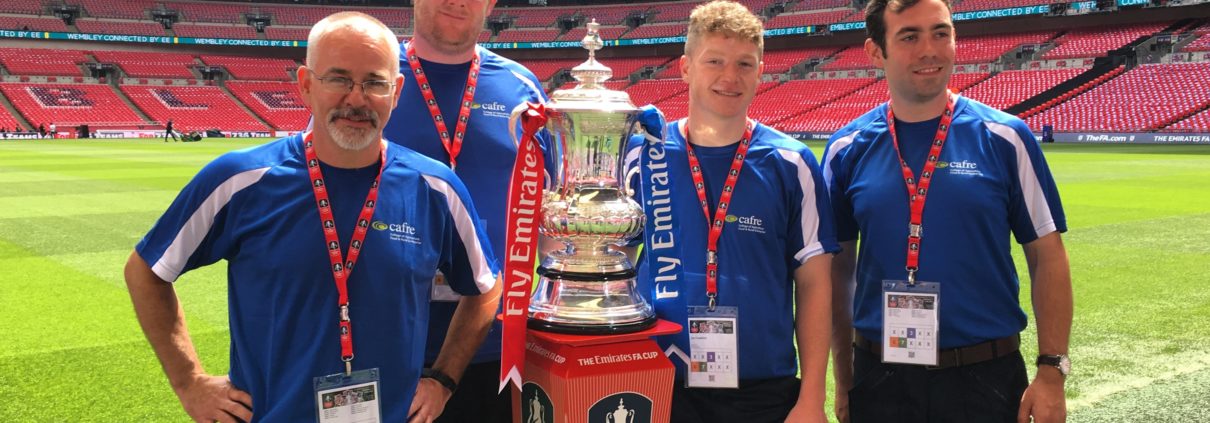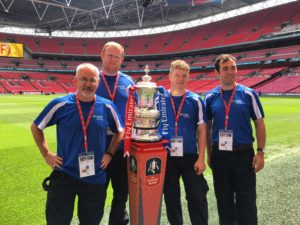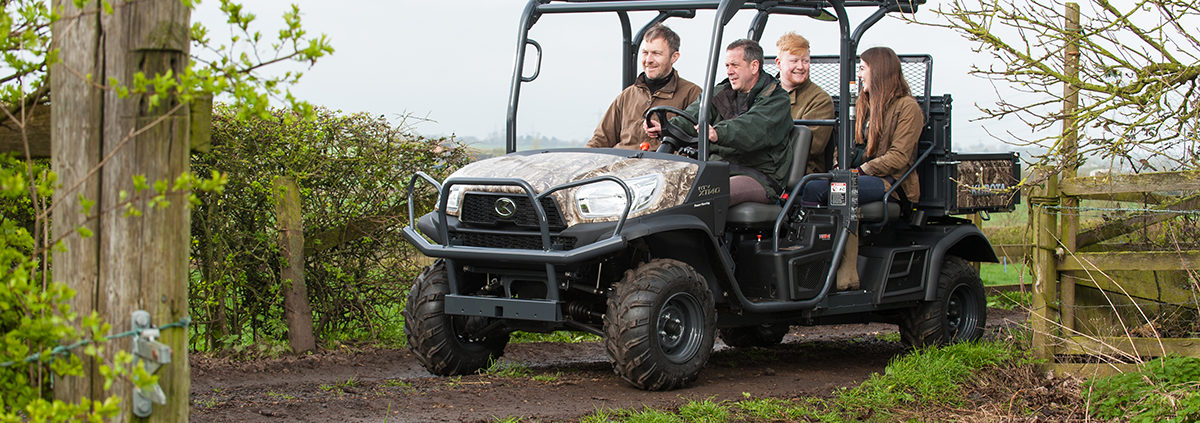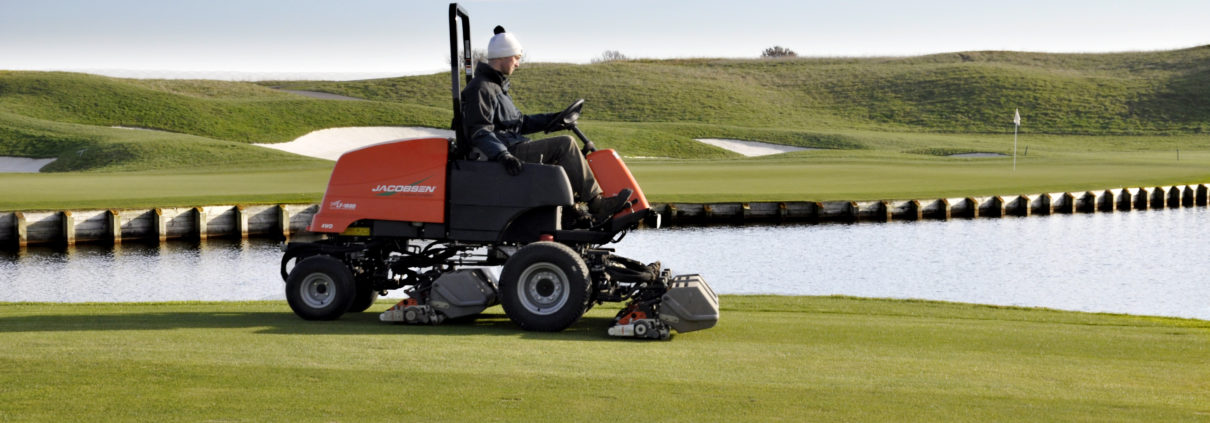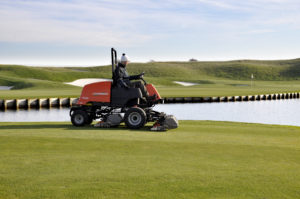SALTEX College Cup Winners
A once-in-a-lifetime ‘Wembley’ opportunity for SALTEX College Cup winners – The opportunity to stand on arguably the most famous pitch in world football on the day of the FA Cup Final is a dream for many, but for four sports turf students from Northern Ireland – the dream has become a reality.
Gavin White, Jon Crawford, Michael Dundee and John Kennedy from CAFRE College in Antrim, Northern Ireland, experienced an unforgettable day when they were part of the Wembley grounds team at the showpiece of the UK’s most historic sporting competition – the FA Cup Final. This once-in-a-lifetime opportunity was their reward, as well as a ‘big’ cheque and cash prize, for leading CAFRE to glory in the 2016 SALTEX College Cup – the Institute of Groundsmanship’s (IOG) national, student-led sports turf challenge.
Sponsored by Ransomes, the competition made its debut at the 2016 SALTEX event at the NEC in Birmingham, where the four CAFRE students competed against student teams from four other UK-based horticultural colleges in their knowledge of horticulture and grounds management know how.
“When we heard we’d beaten all the other teams and got our hands on the trophy, it felt like we’d just won the FA Cup!” said first year sports turf student Michael Dundee.
The team met with Wembley Stadium head groundsman Karl Standley on the morning of the big game between Chelsea FC and Arsenal FC, and were briefed on the day’s pre-match proceedings before getting straight into morning preparations.
“Karl Standley and the rest of his team were very welcoming from the start,” said Level 3 sports turf student John Kennedy. “To assist in the preparation of the ground on the morning of match day was a great opportunity; the meticulous preparation and attention to detail was staggering, from brushing the red carpet to scissor-trimming the edges of the goal uprights and ensuring the goals were secure and spirit-level straight.”
As the CAFRE students spent the morning learning and working with one of the most finely tuned grounds team in the industry, it wasn’t long before Cup Final fever starting creeping into the stadium – an excitement which was certainly contagious for Level 3 greenkeeping student Jon Crawford.
“Being a massive Chelsea fan, it was an additional bonus to be part of the event,” Jon said. “We got to walk all around the stadium, we sat in the dug outs and even had our picture taken with the FA Cup – it was an experience that I will remember forever.”
Even though Jon’s team didn’t get the result he was hoping for, once the pre-match preparation had finished Jon and the rest of the CAFRE team had arguably some of the best seats in the stadium as they sat pitch-side, behind the goal alongside other members of the Wembley grounds team.
At the end of the game, CAFRE student and Arsenal fan Gavin White – a Horticulture Foundation degree student, enjoyed watching his team win the game and lift the famous trophy. But there was no time for celebration, because the students were immediately back to work repairing the pitch for the League Two Play-Off Final which was taking place the next day.
“Today has just been an out-of-this-world experience. The IOG have been fantastic, the College have been fantastic, the staff here at Wembley have been amazing and I would like to say thank you for this wonderful opportunity,” Gavin said.
Karen Proctor, international marketing and communications manager for SALTEX College Cup – Ransomes – said she was extremely proud to support the IOG’s learning initiative.
“The competition is a fantastic initiative created by the IOG to challenge and reward passionate and dedicated men and women within the groundscare industry,” Karen said. “The prize of helping to maintain the Wembley pitch before the FA Cup Final is a once-in-a-lifetime experience, and one that Ransomes is very proud to have helped make possible.”
IOG CEO Geoff Webb said the initiative is all about raising industry standards. “The SALTEX College Cup is something that we feel very strongly about in terms of raising standards across the industry and creating interest, developing individual skill, and hopefully giving people the confidence to go for the big jobs such as Wembley itself.”
Meanwhile, Dan Prest, the IOG’s head of membership services, confirmed that the SALTEX College Cup will be even bigger at the 2017 SALTEX event.
“We’ve gone from five participating teams in 2016 to a potential nine or ten teams this year. For the individuals it is a fantastic CV builder. At some time in the near future many sports turf students are all going to be going for the same jobs, and it is whoever stands out the most – so this kind of experience will really help them on their career path.
“For the 2017 SALTEX College Cup, we have a prize lined up that will be equal in stature and reputation to the FA Cup Final experience – so watch this space!”
To watch a video overview of the day, click here
All colleges interested in participating in the 2017 SALTEX College Cup should email Dan Prest at dprest@iog.org for more details.
SALTEX 2017 will be held at the NEC, Birmingham on 1 and 2 November 2017. For more information visit www.iogsaltex.com
For the latest industry news visit turfnews.co.uk
Get all of the big headlines, pictures, opinions and videos on stories that matter to you.
Follow us on Twitter for fun, fresh and engaging content.
You can also find us on Facebook for more of your must-see news, features, videos and pictures from Turf Matters.

